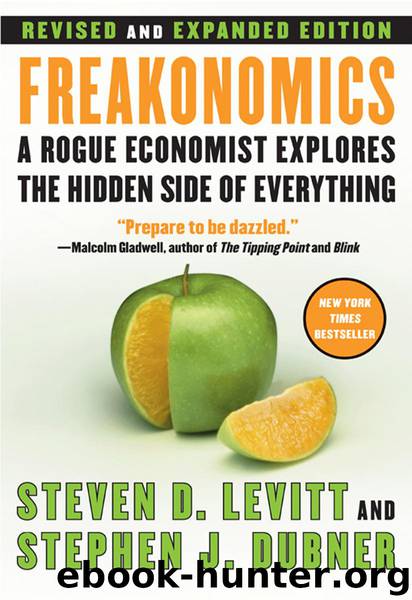Freakonomics by Steven D. Levitt

Author:Steven D. Levitt
Language: eng
Format: mobi, epub
Publisher: HarperCollins
Published: 2006-04-30T18:30:00+00:00
A child who had a low birthweight tends to do poorly in school. It may be that being born prematurely is simply hurtful to a child’s overall well-being. It may also be that low birthweight is a strong forecaster of poor parenting, since a mother who smokes or drinks or otherwise mistreats her baby in utero isn’t likely to turn things around just because the baby is born. A low-birthweight child, in turn, is more likely to be a poor child—and, therefore, more likely to attend Head Start, the federal preschool program. But according to the ECLS data, Head Start does nothing for a child’s future test scores. Despite a deep reservoir of appreciation for Head Start (one of this book’s authors was a charter student), we must acknowledge that it has repeatedly been proven ineffectual in the long term. Here’s a likely reason: instead of spending the day with his own undereducated, overworked mother, the typical Head Start child spends the day with someone else’s undereducated, overworked mother. (And a whole roomful of similarly needy children.) As it happens, fewer than 30 percent of Head Start teachers have even a bachelor’s degree. And the job pays so poorly—about $21,000 for a Head Start teacher versus $40,000 for the average public-school kindergarten teacher—that it is unlikely to attract better teachers any time soon.
Matters: The child’s parents speak English in the home.
Doesn’t: The child’s parents regularly take him to museums.
A child with English-speaking parents does better in school than one whose parents don’t speak English. Again, not much of a surprise. This correlation is further supported by the performance of Hispanic students in the ECLS study. As a group, Hispanic students test poorly; they are also disproportionately likely to have non-English-speaking parents. (They do, however, tend to catch up with their peers in later grades.) So how about the opposite case: what if a mother and father are not only proficient in English but spend their weekends broadening their child’s cultural horizons by taking him to museums? Sorry. Culture cramming may be a foundational belief of obsessive parenting, but the ECLS data show no correlation between museum visits and test scores.
Matters: The child is adopted.
Doesn’t: The child is regularly spanked.
There is a strong correlation—a negative one—between adoption and school test scores. Why? Studies have shown that a child’s academic abilities are far more influenced by the IQs of his biological parents than the IQs of his adoptive parents, and mothers who offer up their children for adoption tend to have significantly lower IQs than the people who are doing the adopting. There is another explanation for low-achieving adoptees which, though it may seem distasteful, jibes with the basic economic theory of self-interest: a woman who knows she will offer her baby for adoption may not take the same prenatal care as a woman who is keeping her baby. (Consider—at the risk of furthering the distasteful thinking—how you treat a car you own versus a car you are renting for the weekend.)
But if an adopted child is prone to lower test scores, a spanked child is not.
Download
This site does not store any files on its server. We only index and link to content provided by other sites. Please contact the content providers to delete copyright contents if any and email us, we'll remove relevant links or contents immediately.
International Integration of the Brazilian Economy by Elias C. Grivoyannis(111059)
The Radium Girls by Kate Moore(12028)
Turbulence by E. J. Noyes(8049)
Nudge - Improving Decisions about Health, Wealth, and Happiness by Thaler Sunstein(7707)
The Black Swan by Nassim Nicholas Taleb(7129)
Rich Dad Poor Dad by Robert T. Kiyosaki(6632)
Pioneering Portfolio Management by David F. Swensen(6301)
Man-made Catastrophes and Risk Information Concealment by Dmitry Chernov & Didier Sornette(6019)
Zero to One by Peter Thiel(5802)
Secrecy World by Jake Bernstein(4753)
Millionaire: The Philanderer, Gambler, and Duelist Who Invented Modern Finance by Janet Gleeson(4478)
The Age of Surveillance Capitalism by Shoshana Zuboff(4292)
Skin in the Game by Nassim Nicholas Taleb(4248)
The Money Culture by Michael Lewis(4207)
Bullshit Jobs by David Graeber(4190)
Skin in the Game: Hidden Asymmetries in Daily Life by Nassim Nicholas Taleb(4007)
The Dhandho Investor by Mohnish Pabrai(3765)
The Wisdom of Finance by Mihir Desai(3747)
Blockchain Basics by Daniel Drescher(3583)
